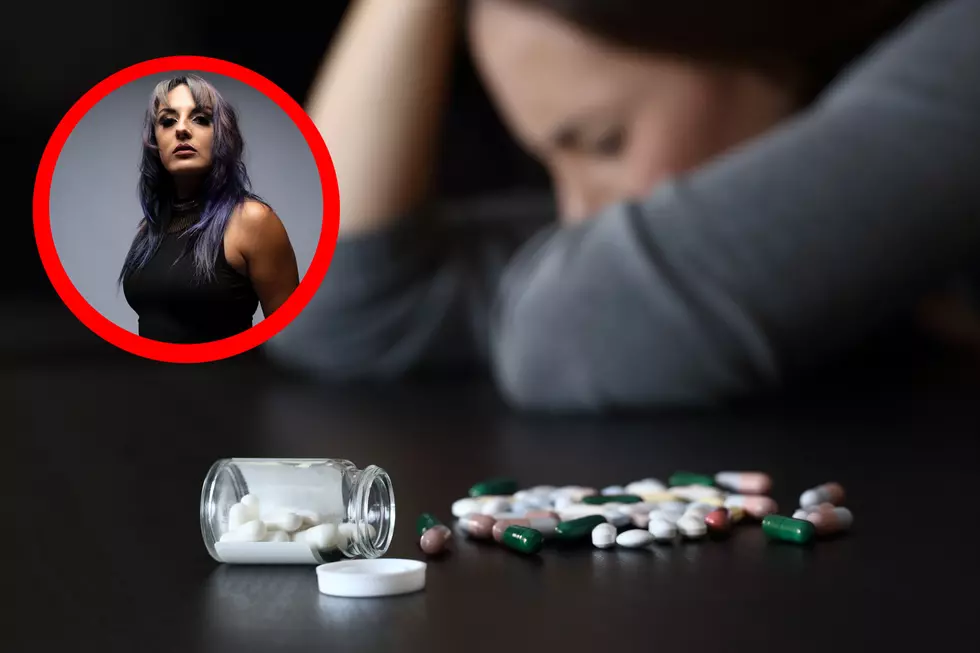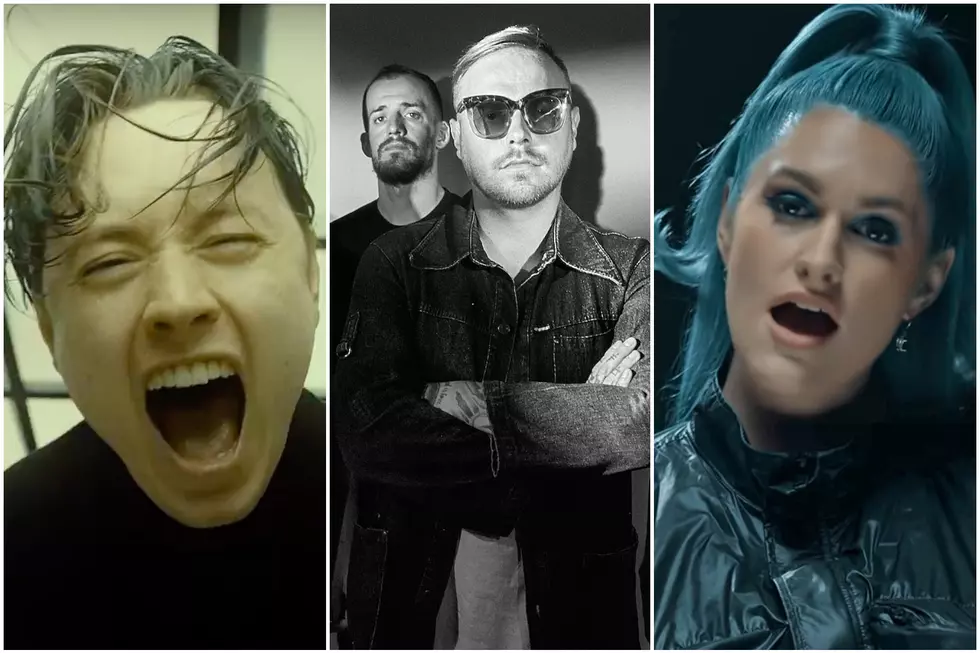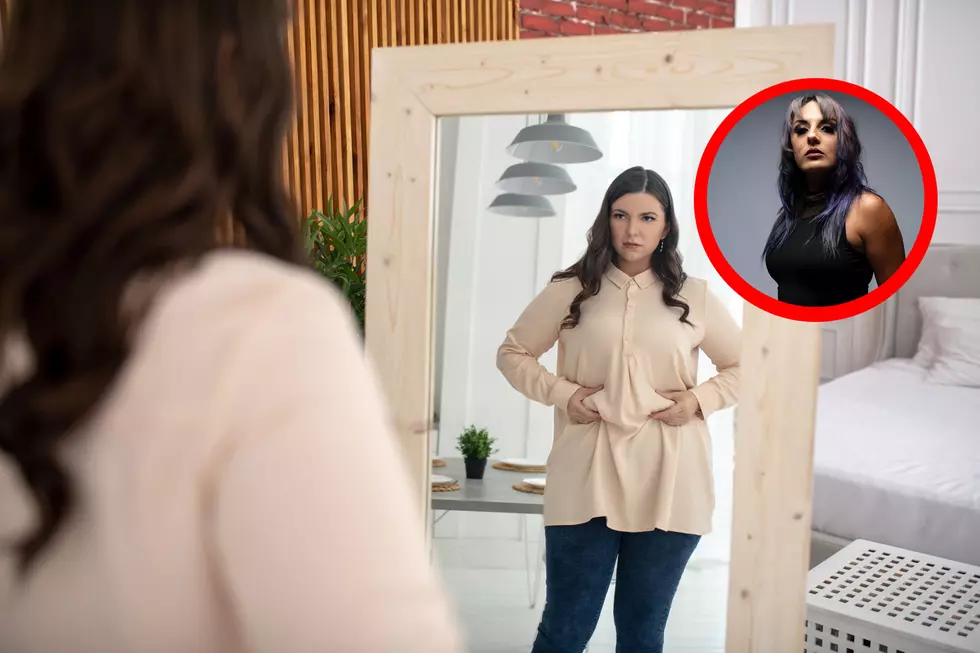
Eva Under Fire’s Eva Marie – The Truth About Substance Abuse
Substance abuse continues to be a very serious issue, not only in just the music world, but on a global level. The reaction to substance abuse can result anti-social behavior, personality changes, physical and sociological harm, or even worse, death.
May is Mental Health Awareness Month and a great time to take stock of how your dealing with your own mental health, what role you can play in developing your mental health conditioning and what practices you can pursue to maintain a good mental health outlook. With this in mind, we've connected with Eva Under Fire's Eva Marie, who when not fronting her up-and-coming rock band has been licensed as an outpatient psychotherapist, primarily working in the areas of anxiety, depression, grief and substance abuse recovery.
Given her expertise in these areas, Eva has graciously agreed to pen this Loudwire column throughout Mental Health Awareness month, putting a spotlight on specific mental health issues and providing some tips on how you can help cope with each. In this article, Eva takes a closer look at substance abuse, why it can be so dangerous and the ways in which you can help.
Partying and concerts just go together, right? It used to be drugs, sex and rock and roll. Now it’s a match made in Hell.
In the wake of yet another devastating loss in the music community (RIP Taylor Hawkins), I’m faced with a hard truth: We are losing too many lives to overdose.
Have party drugs become more dangerous? Are people too desensitized to the severity of drug use? Is there more to learn about the full scope of misuse, abuse and full blown addiction? The answer to all of these is YES.
As a musician, a therapist and someone who has loved people in the throes of addiction (RIP Dad), my heart breaks for those who are battling that demon but it also SCREAMS for answers! How can we learn to better support recovery? What happens to change the brain so completely? I’d like to share with you a few things I’ve learned. Here’s the truth about substance abuse.
The Problem
Casual use can turn into full blown addiction really fast. Our brain loves patterns. That’s why it’s so hard to break even bad habits. On top of that, when addictive substances are introduced, a chemical change occurs in the brain. Suddenly, the drug needs to be present in the body for the brain to produce natural pleasure chemicals. Without it, the person struggles to find enjoyment in anything else. They have a brain disease. Reversible and curable yes, but difficult to fight.
Recovery is possible, but it takes time for the brain to re-calibrate. Decision making also is affected. Think about all the “Friends Don’t Let Friends Drive Drunk” signs then amplify that risk by 1,000 if your friend isn’t just a “casual drinker.” The risk gets a million times worse if the drug is synthetic and doesn’t come from a store or dispensary: pills, cocaine, heroin, meth, even marijuana from an unknown source. Drugs don’t always play nice if used together, either, especially if fentanyl is accidentally involved.
Ever wonder why these people don’t just stop abusing drugs? If you visit an inpatient recovery center, the first thing they’ll make you watch is an informational video about what addiction does to the brain. They want families to understand that your loved one is not presently able to make good decisions. They don’t stop because they can’t. The drug is in the driver’s seat.
For me, it felt like watching my person turn into a zombie. They walked and talked like my person, but they didn’t make decisions like my person and that made them dangerous. I couldn’t trust them as I once did. The trauma of that experience stays with me. If you’re morbidly curious to know more about my personal experience or if you unfortunately relate and need good music to scream along to, you can listen to the songs "Heroin(e)" and "Comatose" by Eva Under Fire. I laid it all out in my lyrics.
The Solution
Good news. There are ways to help!!!
1. If someone you care about is buying from street dealers and they’re not ready to “give up partying," please encourage them to test their drugs!!! And/or carry Narcan. This approach is called harm reduction. Local pharmacies often carry test strips. You can Google how to test your drugs and save a life from potential fentanyl overdose.
Fentanyl somehow leaked into the street market and its very presence is accidentally killing people by the thousands. Street dealers aren’t FDA approved, so I don't know how they clean their work space. As a result, “bad batches” could be anywhere. Originally used to “increase the high for a cheaper price,” fentanyl is 50 times stronger than pure heroin, and it only takes a tiny amount to kill. Pour 6 grains of table salt onto your countertop. That’s a lethal dose of fentanyl.
2. There are different types of recovery programs. Complete abstinence (NA, AA) is needed in many cases but not all. Problematic use or misuse can look different than addiction.
Know someone who parties too hard or too often? Someone who runs out of their prescribed medication before the next refill? Drinks or uses to cope with stressful or negative situations? SMART Recovery might help: https://www.smartrecovery.org.
Some people find recovery through individual psychotherapy and choose not to participate in a recovery program or community. But if they’re struggling hour by hour or with daily use, a community is super helpful for constant support.
3. Talk about uncomfortable things. Ask hard questions. Let people around you know you’re concerned and care enough to ask. About their money. About their time. About how sad or jittery they seem. Or about the last time you saw them at that party and they were high out of their mind.
Substance abuse is usually born out of an individual's negative emotional experience as a coping strategy. The drug becomes a friend. But drugs are liars and we don’t need liars as friends. We need real friends. Especially when we lose ourselves. Musicians are particularly susceptible. Often isolated from our support systems for extended periods of time while on tour, it’s easy to doubt your sense of self and intrusive thoughts can begin to take over. Open, honest, caring communication (even if it’s firm but caring) can be so helpful.
We all need help sometimes. Substance abuse is often treatment resistant, but once purged, the brain can heal and we can find ourselves again. I know because someone I love lost their fight and I’m forever heartbroken. But my heart is healing because two other loves of mine, found their way home. #wedorecover
Much Love,
Eva
Other Resources:
Hope Not Handcuffs: https://www.familiesagainstnarcotics.org/hopenothandcuffs
Alcoholics Anonymous (AA): https://www.aa.org
Narcotics Anonymous (NA): https://na.org
Substance Abuse and Mental Health Services Administration: https://www.samhsa.gov
Fentanyl Detection Kits: https://www.walmart.com/ip/Fentanyl-Detection-Test-For-narcotics-detection-in-samples-and-on- surfaces-Single-use-test-kit-2-Count-Box/905516837
Our thanks to Eva Under Fire's Eva Marie for her series of Loudwire columns for Mental Health Awareness Month. The band's song "Unstoppable" from their 'Love, Drugs & Misery' album is available now and you can pick it up and find the group's touring information via their website.
66 Most Important Moments in Metal History
More From KZCD-FM










